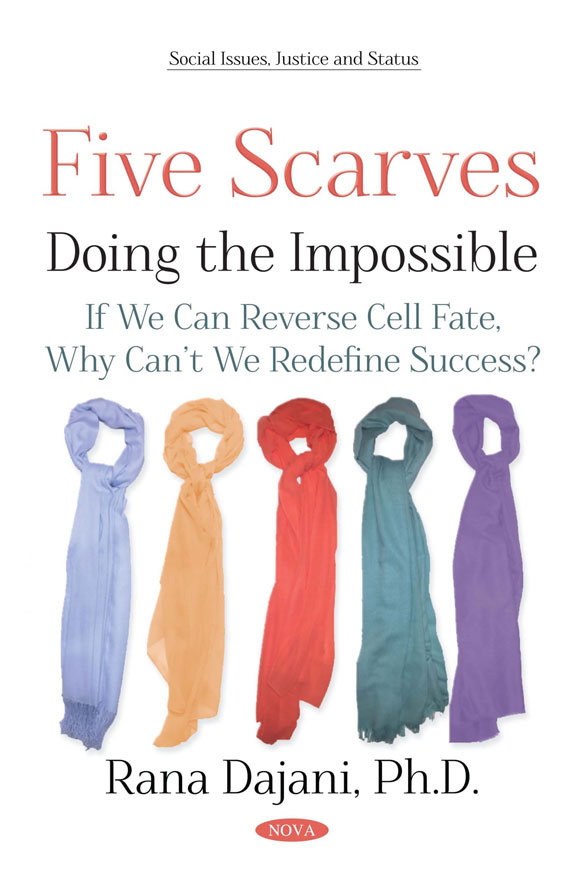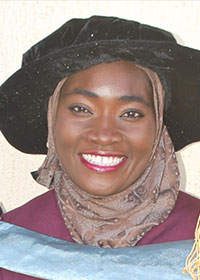Fulbright Chronicles, Volume 2, Number 1 (2023)
Author
Habiba I. Atta

Five Scarves by Rana Dajani, winner of a Fulbright Foreign Student Scholarship in 2000 at the University of Iowa and a Scholar Research Award at Yale University in 2012.
Five Scarves offers amazing insights into the life of a highly successful academic, an associate professor of biology and biotechnology at the Hashemite University in Jordan, a Fellow at the Harvard Radcliffe Institute, and the recipient of numerous prestigious awards. Her book reveals the challenges she faced and the ultimate rewards she received, and she discusses these facets of her life using five “Outlooks” which are represented by the five scarves of the title: teaching pedagogy; research; gender issues; religion and culture; and writing skills.
Dajani’s approach shows the multiple layers which may not be apparent but are vital in defining a Muslim, Arab female in the world of research.
This approach provides a broad perspective and shows the multiple layers which may not be apparent but are very vital in defining a Muslim, Arab female in the world of research. Dajani, a Palestinian-Syrian-Jordanian molecular biologist, had the privilege of conducting research in a developing country (Jordan) and a developed country (the United States), which defined her journey, made her stand out amidst the challenges, and allowed her to attain an elevated status in the global scientific community.
The author’s strong sense of family values did not derail her from achieving great heights in her career, and we can see the lasting effect that principles set in early childhood had on defining her life as a dedicated wife, mother (of four children), and scientist. She involved her entire family in her work and research, thus allowing them to appreciate and understand her work. Her family values enabled her to balance her work and family effectively. She never let her family feel her absence from home despite her dedication to her research and work (both as a graduate student and a faculty member). Time management is another value which the author used effectively, thus granting her a well-balanced work, family, and social life.
One beautiful aspect of the author’s life which kept recurring throughout her journey in life is her love of reading. She firmly believes that “[R]eading is essential to the formation of a child’s personality and imagination” (61). This directly or indirectly affected her major life choices and played a critical role in transforming a hobby into what effectively became a movement. She is the founder and director of the NGO We Love Reading which strengthened communities in her country and across the globe and was adapted in over thirty countries. The project greatly increased literacy rates not just among children but also among adults.
Pedagogy, as applied to the natural sciences, was demonstrated to be flexible and dynamic. Her constant quest to be a better educator and scientist led her to apply tactics that strengthened the self-confidence and the necessary curiosity of her students. She achieved this by encouraging them to become independent thinkers and to apply their own rational approach in providing solutions to scientific problems. She unequivocally showed that it was very pertinent for educators to always challenge their methods in order to become better versions of themselves, and ultimately this was transferred to her students.
Dr. Dajani’s style of mentorship elicits a sense of social responsibility and strong self-confidence in her students, leading them to make better career choices. A good example of this is the Community Awareness Project, which involved her students in providing solutions to problems in the society.
The role of multi-disciplinary research in tackling issues that are potentially multi-dimensional was also highlighted. Dr. Dajani described how a collaborative research study she initiated led to the development of a DNA database which traced the lineage of Circassian and Chechen populations in Jordan and led to the discovery of a new genetic risk factor for diabetes and an eventual collaboration with two universities in the United States.
She also highlights misconceptions about gender representation in the academy, and how vital information about specific geographic regions is often misconstrued due to preconceived notions. Gender bias in academia is discussed in detail, especially in relation to recruitment and eventually, personal development initiatives. “Women are constantly reminded in contemporary society that their worth and value lies primarily in the home,” she writes (94), encompassing the author’s perception about the lopsided opportunities in the workplace. In her view, the favoritism enjoyed by male applicants is a result of the dominant presence of males in hiring boards in academia.
The author also provides valuable insight on Islamic tenets and how they have favored and protected the rights of women over the centuries. Despite the occasional gender biases faced by the author in her career, she finds solace in her faith which seeks to correct such prejudice against females in general.
Five Scarves inspires creativity in academics and indeed other professionals in the execution of their duties, thus opening up additional avenues of expression. As a fellow academic, I have certainly been motivated by the approaches used by Dr. Dajani in educating and mentoring her students, which is evidence that we can push ourselves to be better in our craft and reap immense rewards.
Rana Dajani, Five Scarves: Doing the Impossible – If We Can Reverse Cell Fate, Why Can’t We Redefine Success? Nova Science Pub. Inc;: 2018. 131 pages. $78.
Biography

Habiba I. Atta was a Fulbright Visiting Scholar in biology at Rutgers University in 2021. She is a Senior Lecturer in the Department of Microbiology, Ahmadu Bello University, Nigeria. Her areas of research include Bioremediation, Bioaerosols, Microbial Ecology, Renewable energy and Biocontrol. She is a recipient of the “Innovators of Tomorrow” grant and the Petroleum Technology Development Fund scholarship for her PhD research. She is a member of the American Society for Microbiology, Nigerian Society for Microbiology, Society for General Microbiology, and 500WomenScientists. She is also a member of the following networks: Climate Action Group, Intergovernmental Science Policy Platform on Biodiversity and Ecosystem Services, and Organisation for Women in Science for the Developing World. Her email is hatta44@gmail.com
